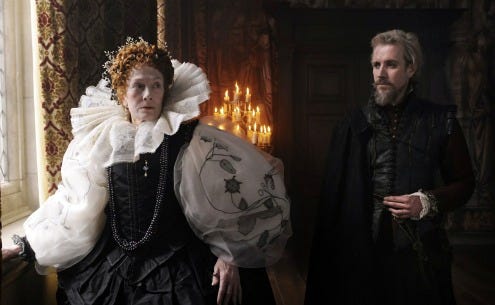Anonymous

"Anonymous" is being hyped as a conspiracy theory story, the gist being that William Shakespeare was not actually the author of all those flowery plays and sonnets. This is not a new idea, as Shakespeare was a commoner of humble schooling and the Brits retain their class snobbery.
The most common theory I've heard is that his contemporary and fellow playwright Christopher Marlowe actually penned "Hamlet" and all the other great works. Marlowe is present in this movie as a minor antagonist, but he's not presented as Shakespeare's doppelganger.
Instead, it's nobleman Edward de Vere, the Earl of Oxford, who allowed an actor named Shakespeare to be his frontman. This Oxfordian Theory is dismissed by most literary authorities as loony — literally Looney, after the English schoolteacher who came up with it.
But this film is not really about promoting an alternate theory of authorship so much as presenting an intriguing (if unlikely) scenario and seeing how it would play out. It makes for a ripping good story, whether or not it's factual.
For those offended at the idea of director Roland Emmerich taking liberties with the biography of a beloved artist, consider the long cinematic tradition of this M.O. Start with "Shakespeare in Love," which won a Best Picture Oscar for a wholly fictitious take on the Bard's love life. Or "Amadeus." Or "Lust for Life."
In some ways, crafting a fantasy out of the life of an artist is the ultimate tribute to his creativity.
And to those still doing a double-take from two paragraphs above — yes, this sumptuous period piece is from the filmmaker behind "The Day After Tomorrow," "Independence Day," "2012" and other schlocky blockbusters. All I can say is the German director has traded in disaster flicks for straightforward drama and takes to it like a duck to water.
Rhys Ifans plays Oxford, a haughty middle-aged lord who summons young Ben Jonson (Sebastian Armesto), a struggling young writer, to make him an offer.
(Interesting that they call themselves writers, rather than playwrights. Back in Elizabethan times, if you wrote for a living it was plays, sonnets or poems. Books were too expensive to print to be the basis of a vocation, and newspapers and magazines were still a ways off.)
The earl desperately wants to see his work performed, but his station does not allow him the luxury of being an artist. His idea is to have Jonson pose as the author. Unfortunately, Jonson confides in his friend Will Shakespeare (Rafe Spall), a bumbling actor who cannot even write his own name.
Shakespeare suggests he serve as a further buffer between the mysterious nobleman and jumps at an opportunity to become the most celebrated writer in London.
The story (screenplay by John Orloff) jumps back and forth in time to 40 years earlier, when Oxford was a young lord who caught the eye of Queen Elizabeth (played by Joely Richardson as a young woman and by Vanessa Redgrave late in life). The later tale is dominated by a struggle over succession made by a couple of young lords, the Earl of Southampton and the Earl of Essex.
In both parallel stories, it is the Cecil family of royal advisors — first William (David Thewlis) and then his son Robert (Edward Hogg) — who act as Svengali to Elizabeth, manipulating her and twisting events to suit their purposes. Like many villains depicted from this era, they are Puritans who use religion as both shield and weapon.
It is true that "Anonymous" has a very large cast that can often be hard to keep track of. There are also several shocking revelations about hidden ties between various parties, which are as unlikely as someone else writing Shakespeare's plays but still have a delicious impact on their own.
Shakespeare himself remains a rather minor character, which is further evidence that Emmerich and Orloff see the whole Oxfordian Theory as a mere jumping-off point for a great story, rather than the crux of their movie.
4.5 Yaps

